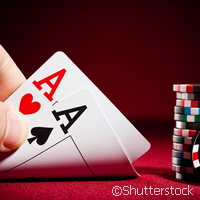Science explains why some games can't really be mastered
Could skill-based games such as chess and poker actually be too complex for the mind to understand, and the idea of mastering them impossible to achieve? According to physicist Dr Tobias Galla from the University of Manchester and Professor Doyne Farmer from Oxford University and the Santa Fe Institute, it seems probable. Having carried out thousands of simulations of two-player games, they observed how human behaviour affects decision-making. The results are published in the Proceedings of the National Academy of Sciences (PNAS). They found that in simple games with a small number of moves, such as noughts and crosses, the strategy is easy to guess, and the game quickly becomes dull for players. However, when games became more complex and call for many moves, as in chess or complex card games, players' actions become less rational as it becomes harder to find the best strategy. It is believed that this research could have far-reaching implications, for example when it comes to financial markets. Many economists base financial predictions of the stock market on equilibrium theory - although as academics point out, in so doing, one assumes that traders are infinitely intelligent and rational. Dr Galla from the School of Physics and Astronomy says: 'Equilibrium is not always the right thing you should look for in a game. In many situations, people do not play [using] equilibrium strategies; instead what they do can [seem] random or chaotic for a variety of reasons, so it is not always appropriate to base predictions on the equilibrium model. With trading on the stock market, for example, you can have thousands of different stocks to choose from, and people do not always behave rationally in these situations, or they do not have sufficient information to act rationally. This can have a profound effect on how the markets react. It could be that we need to drop these conventional game theories and instead use new approaches to predict how people might behave.' Now, academics are looking to expand their study even further, to include multiplayer games. A particularly relevant area of interest for our times will be how the game itself changes with time; this would be a closer analogy of how financial markets operate, it is believed. From preliminary results, it appears that as the number of players increases, the chances that equilibrium is reached decreases. So for complicated games with many players, such as financial markets, equilibrium is even less likely to eventually prove to be the full story.For more information, please visit: The University of Manchester http://www.manchester.ac.uk/(opens in new window)
Countries
United Kingdom



